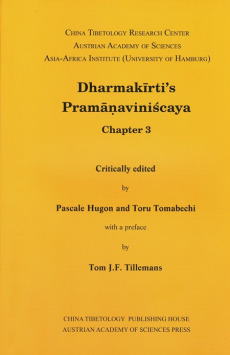Dharmakīrti’s Pramāṇaviniścaya, Chapter 3
Critically edited by Pascale Hugon and Toru Tomabechi with a preface by Tom J.F. Tillemans
Reihe herausgegeben von Dramdul, Reihe herausgegeben von Harunaga Isaacson, Reihe herausgegeben von Helmut Krasser, Vorwort von Tom J.F. Tillemans, Herausgegeben von Toru Tomabechi, Herausgegeben von Pascale Hugon
Reihe: Sanskrit Texts fromt the Tibetan Autonomous RegionDer Pramanaviniscaya, ein Hauptwerk buddhistischer Epistemologie, wurde von dem einflussreichen indischen Philosophen Dharmakirti in der ersten Hälfte des 7. Jh. n.u.Z. verfasst. Das dritte Kapitel (pararthanumana-pariccheda), das der Argumentation im Kontext der philosophischen Debatte gewidmet ist, wird hier zum ersten Mal in seiner Sanskritversion als kritische Edition vorgelegt. Die zwei ersten Kapitel, die der Wahrnehmung und der Schlussfolgerung gewidmet sind, wurden von Professor Ernst Steinkellner kritisch ediert und 2007 in derselben Serie publiziert. Die vorgelegte Edition des Sanskrit-Textes beruht auf zwei vollständigen codices, drei größeren und einem kleineren Fragment, die in der Kopiensammlung des China Tibetology Research Center, Beijing, liegen, und einem einzelnen Blatt aus den National Archives, Kathmandu. In der Einleitung, wo die editorischen Konventionen erklärt werden, werden zusätzliche Information bezüglich der zugänglichen Quellen und ihrer Beziehung gegeben; dazu wird insbesondere die Verwendung der Übersetzung rNgog Blo ldan shes rabs als Testimonium diskutiert. Die Appendizes beinhalten Korrekturen zum tibetischen Text, ein Verzeichnis der Marginalien und eine Liste der Verse mit Varianten im Vergleich zum Pramanavarttika. Eine detaillierte Synopsis des Kapitels, eine Bibliographie sowie Indizes von Namen, Textreferenzen und Versen vervollständigen das Werk.
…
The Sanskrit original of the third chapter of the Pramanaviniscaya, a fundamental work of Buddhist epistemology and logic by the Indian philosopher Dharmakirti, who was active in the first half of the 7th century CE, is presented here for the first time in the form of a critical edition. The first two chapters of this work, devoted to perception and inference, respectively, have already been edited by Prof. Ernst Steinkellner and appeared in the same series in 2007. In the third and final chapter (pararthanumana-pariccheda) of his work, Dharmakirti deals with the subject of argumentation in the context of philosophical debate. The present edition is based on two complete and three incomplete manuscripts that are in the collection of photocopies at the China Tibetology Research Center, Beijing, as well as a single folio from the National Archives, Kathmandu. The introduction explains the editorial conventions, adduces additional information regarding the available sources and their relationships, and discusses in particular the relevance of using the 11th-century Tibetan translation by rNgog Blo ldan shes rab as a testimonium. The appendices include corrections to the Tibetan text, a register of the marginalia, and a list of the verses recording the variants in the Pramanavarttika. A detailed synoptic analysis, a bibliography, and indices of names, textual references and verses complete the work.
